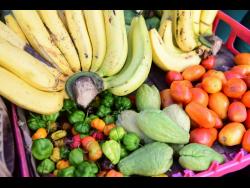
Dr Suzanne Soares-Wynter, a clinical nutritionist at the Caribbean Institute for Health Research, has described as “frightening” the findings of a recent United Nations report, which revealed that more than half of Jamaicans experienced moderate to severe food insecurity.
The UN describes someone as food insecure when they lack regular access to enough safe and nutritious food for normal growth and development and an active and healthy life.
“That means that every other person you see on the road on a daily basis can’t either afford or access [food],” Soares-Wynter said.
The UN’s Food and Agriculture Organization (FAO), in collaboration with several partner organisations, released the Regional Overview of Food Security and Nutrition on Monday.
The report revealed that 55.1 per cent of Jamaica’s population experienced moderate to severe food insecurity for the period 2021-2023, and 22.1 per cent of Jamaicans were unable to afford a healthy diet in 2022.
Soares-Wynter pointed out that these findings align with those from the 2017 Jamaica Health and Lifestyle Survey, which showed that two-thirds of the Jamaican population were classified as having low food security, while one in every 20 individuals faced very low food security, indicating widespread inadequate food consumption or an inability to afford food.
“The groups that are generally vulnerable are children and the elderly or people who are poor, people who live in urban centres. Because in rural, most people would have access to farms and so on, but in urban centres, you find that people don’t necessarily have access to fresh fruits and vegetables,” she said.
She lamented Jamaica’s food retail market, which, she says, is heavily ultra-processed foods which were “proven to be unhealthy”.
The report also categorised Jamaica as a net-importer of agri-food products, meaning that it imports more than it exports, thus making it vulnerable to global food supply disruptions caused by climate variability and extremes.
Jamaica’s annual food import bill totals approximately US$1.4 billion, accounting for more than 18 per cent of all imports.
Insufficient investment
This reliance on imports, Wynter argued, has resulted in insufficient investment in our local agricultural sector and has caused changes in eating habits.
“Normally, food insecurity is associated with undernutrition and malnutrition, but this is what they call the nutrition transition, where we shift our diet from healthy produce, traditional natural fruits and vegetables into these ultra-processed foods that are poor quality, cheap, wildly available, (and) not nutritious,” she said.
Emphasising Jamaica’s high rate of non-communicable diseases, which is the leading cause of death on the island, Soares-Wynter said updated food labelling standards are crucial so that people can make more informed decisions about what they eat.
She is also urging the implementation of a national school nutrition policy to ensure that children are afforded a healthy meal while at school. The policy is currently awaiting Cabinet approval before it can be implemented
“At least the policy will ensure that all children, regardless of social or economic status, whether from a low-income community, rural, or wherever that we have a school nutrition policy in place, and it’s going to regularise or regulate the quality of food that is in place so at least children at their most vulnerable growing stage will be guaranteed their right to healthy and nutritious foods,” she said.
The report also stated that Jamaica has one of the highest costs of a healthy diet in the region, estimated at 6.42 purchasing power parity (PPP) dollars per person per day in 2022. The FAO uses PPP dollars to measure the cost of healthy diets and the hidden costs of agrifood systems.
Economist Dr Adrian Stokes told The Gleaner that macroeconomic stability and the boom in employment experienced in areas like the business process outsourcing sector has driven down the rate of unemployment over time. However, he emphasised that policy must now evolve to capitalise on macroeconomic stability, paving the way for sustained economic growth and an eventual rise in real wages over time.
Jamaica’s unemployment rate is currently at 3.5 per cent.
“The monetary policy regime in Jamaica is credible, anchored by an independent central bank with a highly respected governor. This means inflation and general cost of living will be well anchored going forward,” he said.
However, he said the increase in public sector wages has effectively eliminated any fiscal room for the Government to do anything meaningful to stimulate the economy for years to come.
“This means that the Government will have to focus on creating an enabling environment where investors will want to invest and employ people in Jamaica. Public policy will have to focus on developing the human capital base of the country by improving the education sector so that Jamaicans can command higher wages going forward,” he said.
